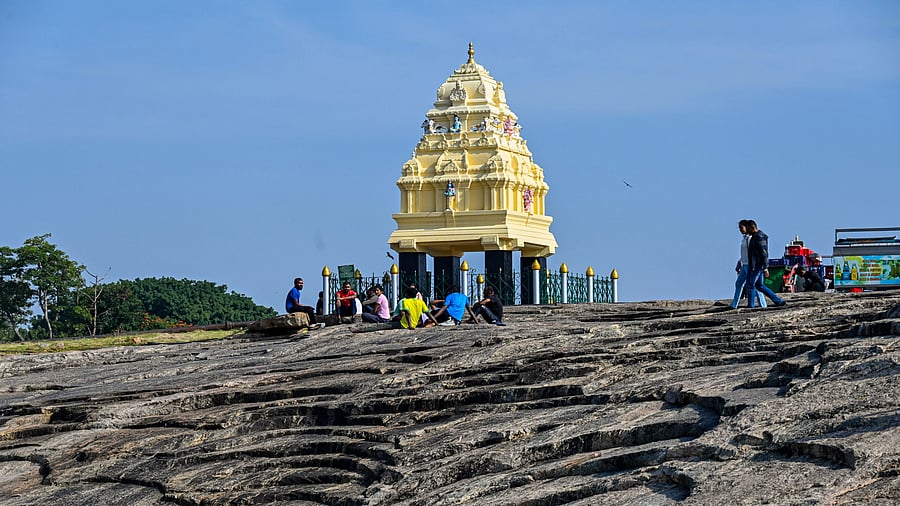
A view of the area at Lalbagh Botanical Garden, where the tunnel road project poses a potential threat to the 300-million-year-old rock formation and fragile ecosystem, including flora and fauna that could be impacted by the project, October 12, 2025.
Credit: DH photo
Bengaluru: The proposal to build a 16.5-km tunnel road between Central Silk Board and Hebbal appears to be on uncertain ground.
An expert committee, constituted by the government itself, had flagged over 121 shortcomings in the detailed project report (DPR), a critical document based on which the government is proceeding with the underground road project.
While project proponents claim to have addressed the committee’s concerns, not all red flags have been attended to. Among the most pressing concerns are the absence of comprehensive geotechnical studies as well as the proposal of building a shaft near the Lalbagh Botanical Garden, an area designated as environmentally sensitive.
Thirdly, the committee had also recommended that at least 90% of the work site area should be free from encumbrances prior to awarding the contract to avoid time and cost overruns, which is yet to be complied with.
In April, the government had constituted the committee, led by S Hegaraddi, Executive Director (Civil) of BMRCL.
The committee was formed after the DPR was criticised as being shoddy and substandard due to copy-paste work. Other committee members included Vinod Shukla (tunnel expert), Major Ashwath Kumar B (road safety expert) and Madhava (retired chief engineer, Public Works Department).
In its 89-page report, submitted to the government a month later, the committee devoted nearly 50 pages to highlight as many as 121 shortcomings in the Rs 9.5 crore DPR. The concerns were raised after visiting the sites to assess the alignment, availability of land, constraints, traffic issues at entry and exit points, shaft locations, and various other.
Subsequently, the committee noted that B-SMILE complied with most of the concerns but went on to add that “bare minimum” geological and geotechnical investigations have been carried out during the preparation of the DPR as against the standard procedure. Based on the metro tunnelling experience in Bengaluru, it predicted surprises during execution. The committee also expects the cost of tunnelling could go up by about 10 to 15% to account for the risk involved in handling unforeseen conditions.
B S Prahallad, technical director of B-SMILE said his department has complied with most issues raised by the committee. “We have also undertaken geotechnical surveys but the concessionaire also carries the responsibility of undertaking similar studies before participating in the tender, which is a standard norm.”
Environmentalist D T Devare, who accessed the committee’s report under Right to Information (RTI) Act, stressed the government should drop the project going by the observations made in the report. He also wondered how the government could pass on the pre-tendering requirements such as preparation of detailed geological study to the concessionaire.